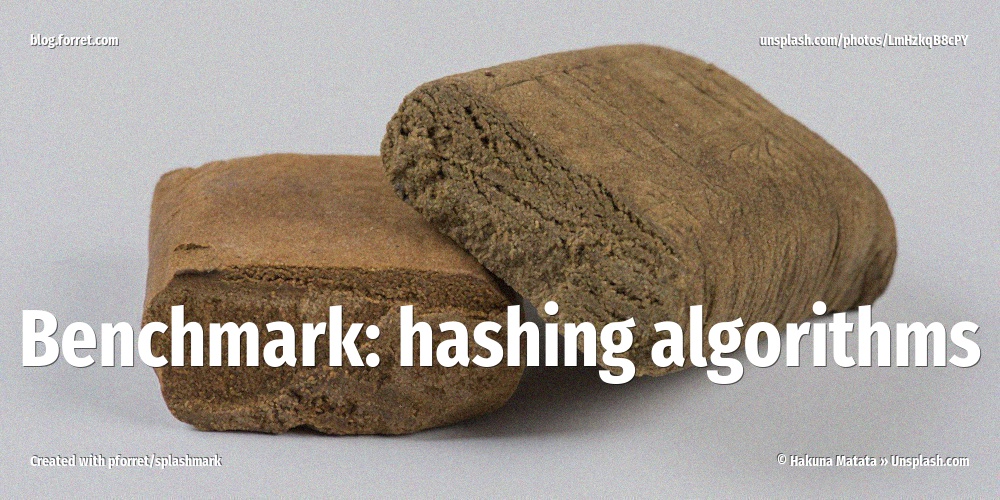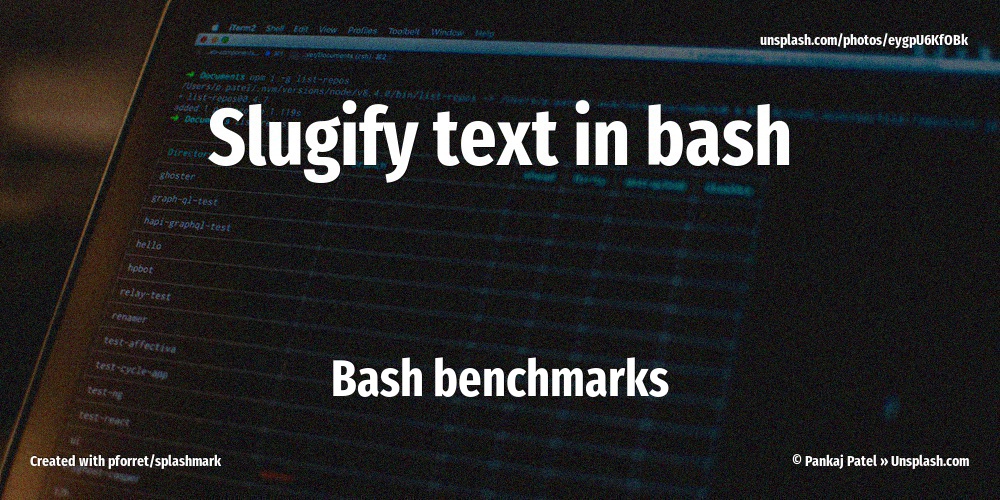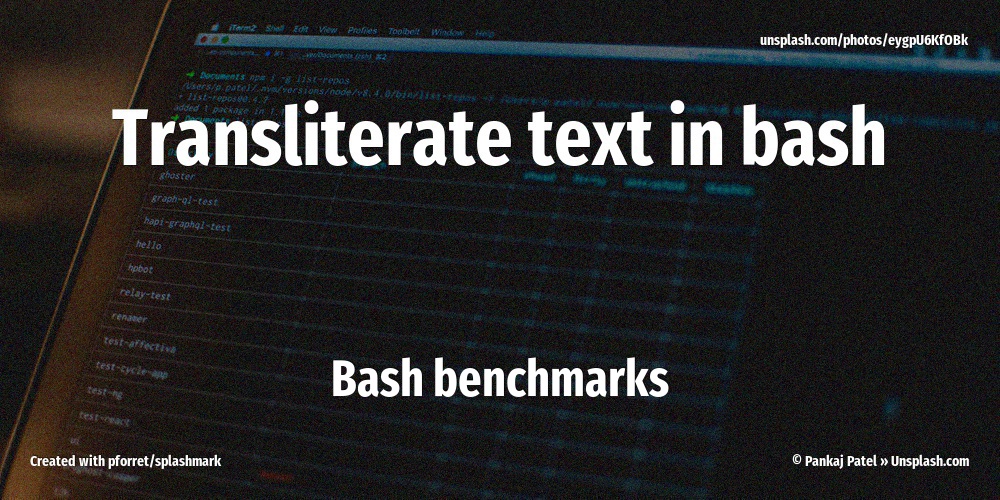Benchmark: hash functions
19 Apr 2022Post #7 in this bash benchmark series, measuring the speed of common bash text manipulations.
In the previous post I talked about installing the GNU version of coreutils on MacOS. That doesn’t just install the GNU version of tr but also a whole collection of other tools. A subset of those are hash functions.There are the classics MD5 and SHA1, but also SHA256, 384 up to SHA512. I would love to know the speed of these algorithms on my Macbook Pro.
A hash function is any function that can be used to map data of arbitrary size to fixed-size values.

Hashing functions
MD5
Developed in 1992, this algorithm is now considered broken and no longer used for cryptography. It can still be used to e.g. check if two files are equal. I still sometimes use it for the generation of filenames for caching, e.g. I save the cache of a webpage https://www.xyz.com/whatever/the/url/is?with=query&even=added to
The MacOS native md5 program:
Command: 'md5'
Before: 'ŁORÈM ÎPSÙM DÔLÕR SIT AMÉT ŒßÞ'
After : 'fa4e6f9fdc5facb035c16612165a2233' (LANG = en_US.UTF-8)
- Binary:
/sbin/md5
The GNU gmd5sum program:
Command: 'gmd5sum'
Before: 'ŁORÈM ÎPSÙM DÔLÕR SIT AMÉT ŒßÞ'
After : 'fa4e6f9fdc5facb035c16612165a2233 -' (LANG = en_US.UTF-8)
- Binary: /opt/homebrew/Cellar/coreutils/9.1/bin/gmd5sum
- Version: md5sum (GNU coreutils) 9.1
They have the same output, as we expect.
SHA
The SHA family of hash algorithms starts with the 1996 SHA-1 (no longer used for cryptography), and superseded by hashes with longer output length: SHA224, SHA256, SHA 384 and SHA512 (the SHA-2 family, from 2001)
Command: 'sha1sum'
Before: 'ŁORÈM ÎPSÙM DÔLÕR SIT AMÉT ŒßÞ'
After : 'aefd95f83be2dc7462da24482cbd0977759d4ce0 -'
Command: 'sha224sum'
Before: 'ŁORÈM ÎPSÙM DÔLÕR SIT AMÉT ŒßÞ'
After : '70e36ca630f2adedd788d844d6f68fcf71976c2efb8e32fd79fd56a7 -'
Command: 'sha256sum'
Before: 'ŁORÈM ÎPSÙM DÔLÕR SIT AMÉT ŒßÞ'
After : 'a6d3386aa0b1eef4229d603b30d0eb607cd6cd9a6fab73d93a567c5d2ae90203 -'
Command: 'sha384sum'
Before: 'ŁORÈM ÎPSÙM DÔLÕR SIT AMÉT ŒßÞ'
After : '53cf0661223582f8df089b70a28ab02c212f180d7396a2bc155d15aa8ddb907f872f16f71385851a6cff284a6a9730a0 -'
Command: 'sha512sum'
Before: 'ŁORÈM ÎPSÙM DÔLÕR SIT AMÉT ŒßÞ'
After : '4ca9b5421ebe4b985adceab12706de72a7c5cb1fec044af3559493b9ca15e26cd9030dd6b7068867b676271dab4189e71b9cae157a630c3176ef64ecd5ded33d -'
Blake 2
The Blake 2 algorithm was released in 2012 and is considered better than the SHA-2 algorithms.
Command: 'b2sum'
Before: 'ŁORÈM ÎPSÙM DÔLÕR SIT AMÉT ŒßÞ'
After : 'f8f0b804649a12456a239e4f1997fef581ee26b5869062093725b6586ff2f930d100b250eb928323afaa0cc274a85140ced258a7977d54c9ae791d49160cc16e -' (LANG = en_US.UTF-8)
Benchmark via pforret/bash_benchmarks
| method | bits | throughput | invocation |
|---|---|---|---|
md5 (native) |
128 | 435 MB/s | 1022 ops/sec |
gmd5sum |
128 | 455 MB/s | 611 ops/sec |
sha1sum |
160 | 552 MB/s | 784 ops/sec |
sha224sum |
224 | 279 MB/s | 807 ops/sec |
sha256sum |
256 | 275 MB/s | 797 ops/sec |
sha384sum |
384 | 437 MB/s | 804 ops/sec |
sha512sum |
512 | 435 MB/s | 782 ops/sec |
b2sum |
512 | 595 MB/s | 777 ops/sec |
Some lessons from these benchmarks:
- almost all GNU hashing tools have about the same invocation time: 700-800 ops/sec, which means +- 1,3 msec per invocation. Only the native
md5is slightly faster in invocation. - the Blake2 algorithm
b2sumis the clear winner: it’s the fastest in throughput (1GB in less than 2 seconds), while also being more secure than the other options.
So what is my recommendation for hashing?
- install/update the GNU coreutils to the most recent version and use
b2sumfor every hashing need.



